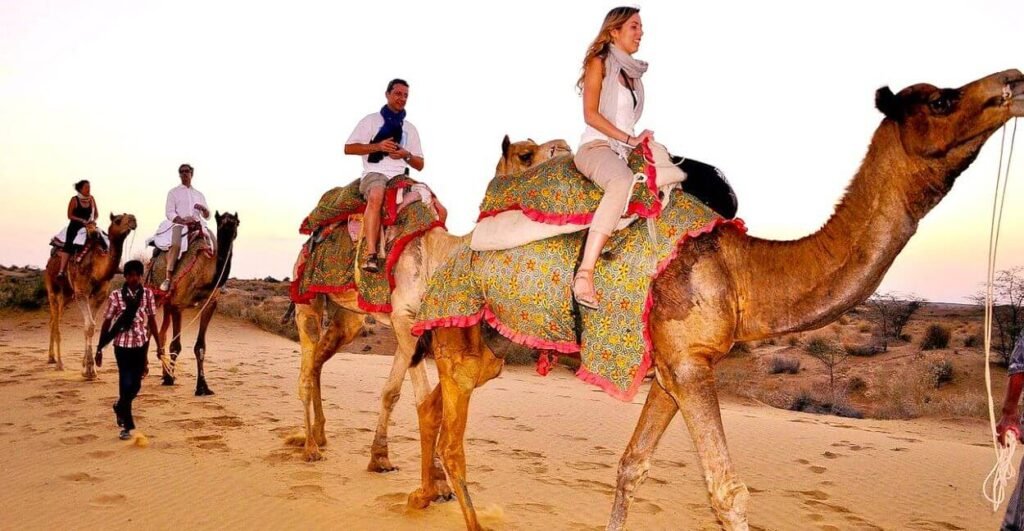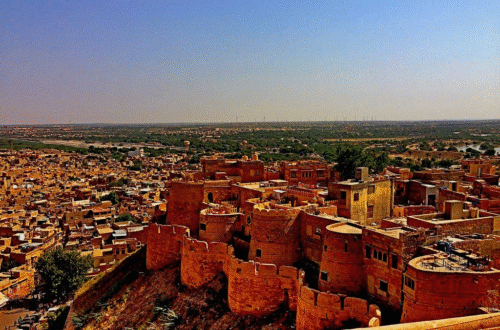Jaisalmer, often called the “Golden City,” is a unique blend of heritage, desert landscapes, and centuries-old traditions. For foreigners visiting this western corner of Rajasthan, understanding local culture and cuisine adds meaning to the journey. This guide offers practical insight into how travelers from abroad can respectfully and authentically experience Jaisalmer’s way of life.
Understanding Local Culture and Customs
One of the first things foreign travelers notice in Jaisalmer is the deep-rooted tradition in everyday life. Greeting people with a respectful “Namaste,” removing footwear before entering homes or temples, and dressing modestly—especially in rural or religious areas—are appreciated forms of cultural sensitivity. The local language is Marwari, but Hindi is widely spoken, and many vendors and guides understand basic English. Learning a few local phrases can go a long way in building rapport and receiving warm smiles in return.
Visiting Historical Sites Respectfully
Jaisalmer is home to architectural marvels like Jaisalmer Fort, Patwon Ki Haveli, and Jain temples that reflect Rajputana and Mughal influences. When visiting these heritage sites, foreign visitors are encouraged to dress conservatively and avoid loud behavior. Photography is usually permitted, but it’s courteous to ask when photographing locals, especially in temples. Many sites may charge a separate fee for cameras or foreign nationals—carrying change in rupees is helpful for such occasions.
Experiencing Desert Life Authentically
The Thar Desert is integral to Jaisalmer’s identity. Experiencing desert life allows visitors to connect with Rajasthan’s nomadic traditions. One of the most immersive ways to engage with the desert culture is by staying at a traditional Desert Camp in Jaisalmer. Here, you can enjoy folk music, camel rides, and desert sunsets, which provide a glimpse into the rural rhythms of the region. These camps often feature performances from local Manganiyar musicians and Kalbelia dancers who preserve Rajasthan’s oral traditions.
Food Etiquette and Local Dining Practices
Cuisine in Jaisalmer is robust, spicy, and heavily vegetarian. Popular dishes include ker sangri (a desert bean dish), gatte ki sabzi (gram flour dumplings in curry), and dal baati churma (lentils with baked wheat dumplings and sweetened flour). Foreign visitors should note that many traditional meals are eaten with hands, although cutlery is generally available in tourist-friendly restaurants. Water served in local eateries may not be filtered—bottled water is recommended. Tipping is not mandatory but appreciated; 5–10% is considered courteous.
Exploring Street Food and Safety Tips
Sampling Jaisalmer’s street food—like kachoris, samosas, and jalebis—can be an adventure in itself. To avoid health issues, choose vendors that are visibly clean and have a steady stream of local customers. If you have dietary restrictions or allergies, it’s best to clarify ingredients beforehand. Using translation apps or carrying a written note in Hindi can assist with communication in smaller stalls.
Dress Code and Climate Awareness
The desert climate of Jaisalmer requires some preparation. Daytime temperatures can be high, while nights are cool, especially between October and February. Light, breathable clothing is ideal for the day, while evenings may require a light jacket. Since much of the exploration involves walking in open areas or sand dunes, closed-toe shoes and sun protection (hats, scarves, and sunscreen) are essential. Women travelers may feel more comfortable in long skirts, salwar-kameez, or trousers paired with modest tops to align with local norms.
Engaging in Cultural Activities Mindfully
Throughout the year, Jaisalmer hosts cultural festivals such as the Desert Festival in February, where you can witness turban-tying contests, camel races, and puppet shows. Attending these events provides rich exposure to Rajasthani traditions. When purchasing local crafts, it is encouraged to buy directly from artisans at government-certified emporiums or village cooperatives. Bargaining is a common practice, but it should be done politely and with respect for the artisan’s effort.
Accommodation and Rural Experiences
For a more immersive cultural experience, consider staying in heritage havelis or desert lodges that offer cultural walks, cooking demonstrations, or village tours. Many properties, especially those offering a Luxury Tent in Jaisalmer, combine traditional aesthetics with modern comfort, allowing guests to appreciate rural life without compromising on hygiene or safety. These accommodations often employ local staff, which supports the regional economy and gives travelers a chance to engage more closely with Rajasthani culture.
Transport, Connectivity, and Currency Notes
Auto-rickshaws, local taxis, and rented scooters are common modes of travel within the city. For longer trips, hiring a private vehicle with a driver is advisable. Mobile networks are generally reliable, and most accommodations offer Wi-Fi. ATMs are available in town, but it’s wise to carry cash when visiting rural areas. Foreign travelers should use authorized currency exchange centers and keep digital and paper copies of important travel documents, including visas and IDs.
Final Thoughts for Responsible Travelers
Experiencing Jaisalmer as a foreign traveler requires curiosity, openness, and respect. Embracing local rhythms, being mindful of cultural sensitivities, and engaging with traditional life beyond surface-level sightseeing creates a more meaningful journey. With a bit of preparation and a respectful approach, foreign travelers can form genuine connections and leave with memories rooted in authenticity.





